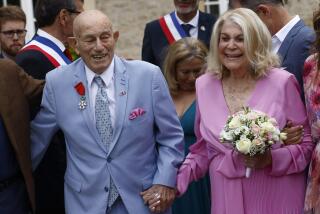I Was a Male War Bride
- Share via
The walls of Gabor “Gabi” Rona’s San Fernando Valley home are covered with celebrity portraits he shot during his 33-year tenure as a staff photographer at CBS Television City. There’s Alfred Hitchcock and Elvis Presley, Lucille Ball and Clint Eastwood--photos that would appear in publications worldwide, including covers for Time and Look magazines. And there, amid the glamour, are the framed yellowed newspaper clippings that document Rona’s own time in the spotlight 50 years ago this month, when he became America’s last male war bride.
The saga began during World War II. Though 36 of his relatives would perish in Nazi camps, Rona, a Jewish photographer living in Hungary, managed to escape, smuggled across the Austrian border in a bread truck. After the war, he was living in a displaced persons camp in Ulm, Germany, when June Blossom Bernstein, a UCLA coed who had served in the U.S. Coast Guard during the war, entered his life.
“My American cousin introduced us,” recalls Rona, a slender, well-dressed man of 79. “He thought a pen pal would help me improve my English. We corresponded for over a year and sent photographs to each other, so I knew her quite well by the time I proposed.”
Under the Alien War Bride Act, June’s military service made her eligible to marry a foreigner and bring him to the United States. “I was a lucky guy,” Rona admits, “because approximately 98% of war brides were women.” In December of 1948, with the act’s expiration date fast approaching, a few sympathetic United Nations employees helped expedite a German civil ceremony between Gabi and June. The newlyweds hastily booked airline reservations from London to New York, but only one seat was available. June insisted that Gabi take it.
Rona arrived in New York at 11 p.m. on Dec. 28, 1948, one hour before the act expired. Their reunion the next day “made front-page headlines, and our photographs are larger than President Truman’s,” Rona quips. Being labeled a male war bride “was a big deal for about a year, then I became a citizen,” he says. “I don’t discuss it with people.” The couple settled in Hollywood, remarried in a religious ceremony and eventually had two daughters, Saundra and Terry. Sadly, though, Rona will mark the 50th anniversary of a World War II romantic milestone without his beloved wife, who passed away nearly three years ago. “If June were alive, we’d have a big celebration. It would have been a very joyous event,” he says. “But this anniversary will be bittersweet without her.”
More to Read
The biggest entertainment stories
Get our big stories about Hollywood, film, television, music, arts, culture and more right in your inbox as soon as they publish.
You may occasionally receive promotional content from the Los Angeles Times.










